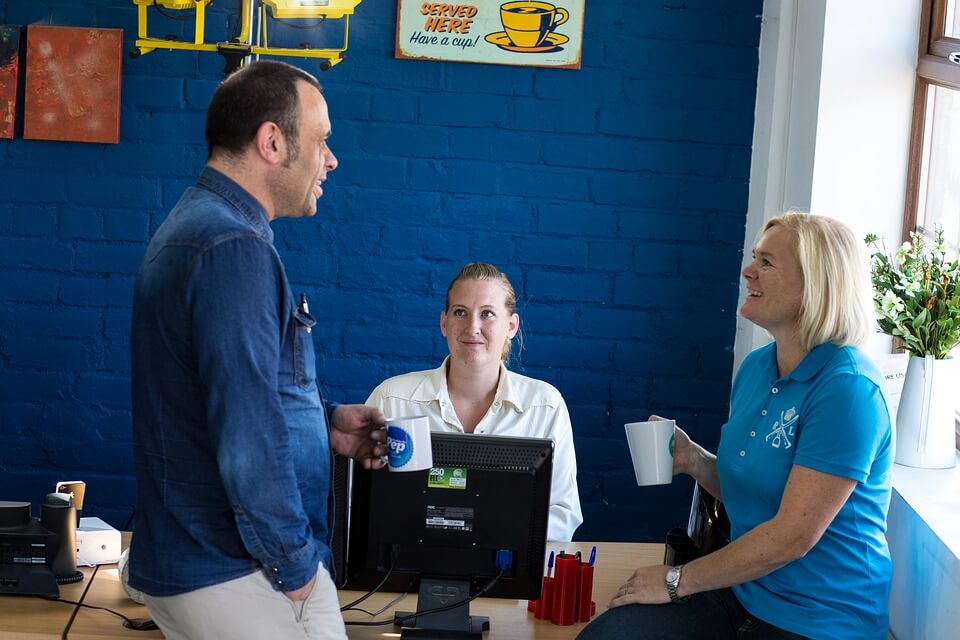Body Language Tips for Phone Interviews
Wait, what? Why would body language matter in a phone interview? The other person can’t even see your body!
I’ll give you two reasons:
First, your body language affects your tone of voice. Your voice may be the only aspect of nonverbal communication your interviewer can pick up on, but how you move and use your body will impact its sound.
I once helped a client with a presentation over the phone. “What have you got for an intro?” I asked. “How about you present it to me?”
He began, but I stopped him almost immediately.
“No,” I said, “Present it as if you had an audience. Right now, you’re leaning back in your chair with your feet up on the desk. Stand up! Give me the speech.”
There was shocked silence for a moment and then he said, “How did you know that!?”
I could hear it in his voice.
Secondly, your body language affects how you feel. Your moods and emotions affect your nonverbal communication, but the reverse is also true. When you use confident body language, you feel more confident. When you use calm body language, you feel
The first time I gave a presentation for a professional group I was so nervous I thought my heart would beat right out of my chest. I’d been trained, though, on presentation skills and confident body language. Before the presentation, I locked myself in a bathroom stall, practiced deep breathing and did power poses. The nerves didn’t go away completely, but wow, what a difference! I was able to walk out of the bathroom and into the meeting room thinking, “Yes! I can do this!” And I did. I gave a great presentation that led to several new clients.
If you want to feel calm or confident or powerful or open, adopt body language that matches those feelings. The feelings will follow!


Change your communication, change your life.
Because of these two things, your body language matters even when no one can see you. Here are three body language tips that will help you sound and feel calm, confident, and powerful during phone interviews:
Stand up
If you can, do the interview standing. Stand up straight, with your weight over both feet. If you have to be seated, make sure you sit up straight and tall. No slouching, leaning, or lounging! The more space you take up with your body, the more confident you will naturally feel.
Straight posture also allows you to breathe better. If you’re slouched or crouched, it’s harder to get a full breath. Good diaphragmatic breathing will add warmth to your voice, calm your nerves, and help you think. But to access that breathing, you need good posture.
During the interview, keep checking in with your feet. Feel your weight over both feet, firmly on the ground. (If you are sitting, feel
Move purposefully
Nervousness often shows up in one of two ways: tension and stiffness or jitters and anxious fidgeting. Calm, confident, powerful body language moves fluidly and freely. It may be still, but not stiff. It may be moving, but not squirming.
If you want to walk while you’re on the phone, do so purposefully, still feeling your feet connected to the ground. Moving around can be a great way to jog your memory or unstick your brain if you’re having a hard time coming up with an answer to a question. The act of changing location, even slightly, can free up your thoughts. Don’t bounce, sway, hop, or pace fretfully. Those movements will show up in your voice. Walk with purpose.
When nervous, many people tap their feet, drum their fingers, rub their hands together, play with pens or keys or jewelry, or any number of other self-pacifying gestures. Some of those sounds can be heard over the phone, and most of them will also affect the tenor of your voice.
Standing and feeling grounded will automatically help with these nervous tics. But when you notice yourself doing them, simply stop. Don’t judge yourself; that will just lead to the “I’m nervous about how nervous I am” vortex. Calm your body, and that will help you have a calm mind and presence during phone interviews, too
Gestur e
If you have a headset, use it. Having your hands free helps with both the previous two tips. Holding your phone to your ear makes poor posture and fiddling movements easier. Most people have “talking on the phone” habits that you’d do better without in an interview. A headset reminds you that this isn’t just a casual chat. It helps you be more purposeful.
When you can gesture with both hands, the interview will feel more natural and real. Often, job seekers go into interviews expecting an interrogation, anxious that they have all the “right” answers. Allowing your hands to move freely can help the exchange feel less like an interrogation and more like a conversation.
In addition, you can use your hands and arms to help boost your confidence. Get your hands out of your pockets and unfold your arms. Open them wide to claim a big space. Spread your fingers or “steeple” (fingertips touching together) to send a message of confidence to your brain. These simple gestures will make you feel and sound more comfortable and confident.
Mindless body language habits can sabotage you in an interview, even if it’s over the phone. Let your body be your ally. With intention (and a little practice wouldn’t hurt, either), you can use body language to your advantage even when no one is looking.
Change your communication, change your life.

CAREER ADVICE

GOV TALK





